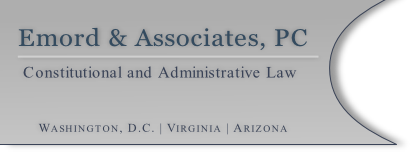
Emord & Associates is dedicated to serving the needs of its national client base. The firm’s attorneys represent clients in constitutional and administrative law cases before the Food and Drug Administration (FDA), the Federal Trade Commission (FTC), the Drug Enforcement Administration (DEA), the Department of Justice (DOJ), the Department of the Interior, the Bureau of Land Management (BLM), the National Park Service (NPS), the Equal Employment Opportunity Commission, the Environmental Protection Agency (EPA), and the Federal Communications Commission (FCC).
FDA | USDA | Import | Export | FTC | Advertising | Compliance | Dietary Supplements | Foods | Labeling | Prescription & OTC Drugs | Cosmetics | Animal Feeds & Supplements | DEA | Controlled Substances | Medicare | Licensing | Commercial Litigation | Contracts | Business | Civil Litigation | Constitutional Law
Copyright © 2010 Emord & Associates, P.C. All rights reserved | Sitemap






Buy “Global Censorship of Health Information,” by Jonathan Emord
Governments around the word prohibit consumers from receiving truthful information concerning disease prevention and treatment effects of nutrients. They censor that health information to protect drug companies from competition. The censorship sacrifices lives.
In this well-
Emord informs the read of the prior restrains on nutrient-
Emord explains not only how and why health information censorship is taking place but also gives the reader a roadmap for litigating and legislating against the censorship. If the proposals in this book come to be implemented, people the world over could well experience not only greater access to health information indispensable to the exercise of informed choice but also a significant decrease in the incidence of disease, and correspondingly greater longevity.




| Significant Cases |
| Health Claims |
| First Amendment Hall of Fame |
| Jonathan W. Emord, Esq. |
| Peter A. Arhangelsky, Esq. |
| Bethany R. Kennedy, Esq. |
| Eric J. Awerbuch, Esq. |
| Josh S. Furman, Esq. |
| Marije Osse |
| News With Views (Emord) |
| Press Releases |
| Upcoming Seminars |
| Take Action |
| Research |
| News |



